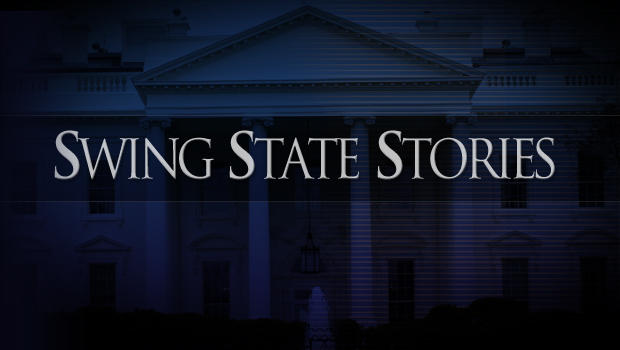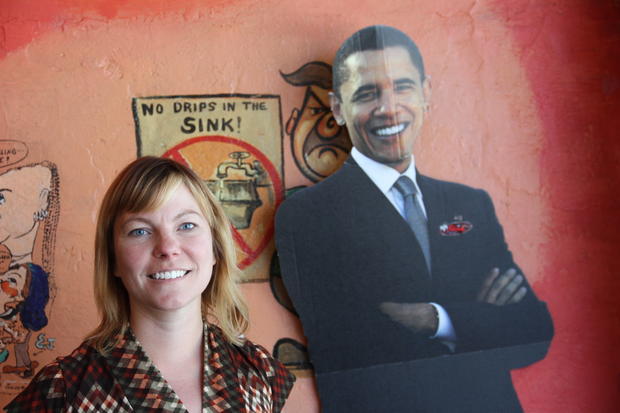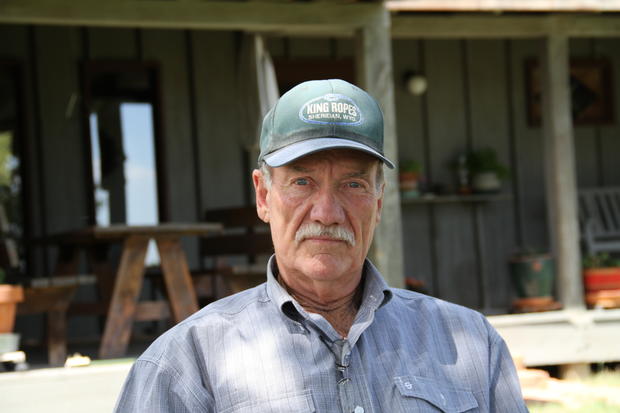A battle for women in a changing Colorado
(CBS News) GREENWOOD VILLAGE, Colorado - It's not anger that Kathy Hanak articulates when you ask her opinion of the two men vying to spend the next four years trying to fix an economy that has yet to recover from the crisis which began in 2008. It's something worse: Futility.
"I don't really like any of them. And I don't really think anything's going to change," she said. "Is that pessimistic? I don't know. It kind of is, you know? I'm just kind of apathetic. I don't really think that one person's vote is going to count for anything."
Hanak is sitting inside Jumpstreet, an indoor trampoline park in this wealthy Denver suburb where preteen boys bounce off rubberized walls as their parents get a few minutes of relative peace. A teacher with two kids, Hanak hasn't been particularly impressed with President Obama. She says his education initiatives have just been "throwing money at the same old problems," and she attributes the capture of Osama bin Laden to a presidential attempt to get good press. But mostly, she's just given up on the federal government as a positive force in her life.
"I just feel like, geez, it doesn't really matter what I do or say," said Hanak. "It's going to be what it's going to be. I just focus on my kids."
Down the road in Littleton, a woman named Kate expressed much the same frustration. Kate, who did not want to give her last name for fear of angering her employer, was "downsized," as she put it, three times after the crisis hit. After 20 years in a solid job in sales, she found herself with no health insurance and working three part-time jobs - including one where she had to unload semi trucks and work in the produce department at a grocery store.
"I'm a hard worker. I just don't get it," she said.
Kate, who is 48-years-old, makes $20,000 less now than she did at the peak of her career. She has her issues with Mr. Obama as well - the health care law was "jammed down our throat point blank," and the stimulus package was "a short-term fix" that didn't address the nation's long term problems. But she doesn't blame him for where things stand now.
"You know, I don't know who the hell to blame to be honest with you," she said. "And I don't really want to place the blame. I want it fixed."
At the moment, she says, she really doesn't care who wins in November.
"I don't think anybody knows how to fix it. I really don't," she said, casting her eyes down the main street in Littleton's historic downtown. "I don't think there's any right answer."
More from this series: In Nevada, Obama must overcome miserable economy
Littleton and Greenwood Village are located in Arapahoe County, a once solidly Republican area that has become perhaps the best bellwether in this hotly-contested swing state. Mr. Obama won Arapahoe by 12 points in 2008, helping him become only the second Democrat since 1964 to take Colorado. His nine-point win was due in large part to the support of women, who vote in greater numbers than men and who have shown themselves to be far less tethered to a particular party. It is these suburban women that both state parties say will win or lose them the election, which is why First Lady Michelle Obama will be here in Arapahoe on Wednesday to campaign for her husband's re-election.
The demographic trends in Colorado would seem to favor the president: There has been an "infusion" of new voters in the Denver area over the past decade, says University of Denver political scientist Seth Masket, mostly from "groups that trend more Democratic" - among them Latinos and transplants from the West Coast who come to the region for the lifestyle it offers. The Census department reports that between 2000 and 2010, Colorado's population increased nearly 17 percent, with that growth clustered in the Denver area. (Population in the nation as a whole grew 9.7 percent during the decade.)
Yet party registration shows just how split the bellwether Arapahoe County remains: There are approximately 120,000 Democrats and 114,000 Republicans registered in the county, with an additional 30 percent identifying as independent. The key to victory with swing voters here, political scientists and state party officials say, is appealing to moderates and making sure not to alienate women. The importance of the latter was driven home by the failed 2010 campaign of Republican Senate candidate Ken Buck, who took a strong stance against abortion rights and asked voters to back him in the primary because unlike his rival, "I do not wear high heels."
Rick Palacio, the chairman of the Colorado Democratic Party, said one of his primary goals is to "ensure that suburban women understand the extreme policies that Mitt Romney and Republicans are pushing." Palacio described the question of "who is on the side of women" as an entree to talk to them about jobs and the economy.
But painting Romney as an opponent of women will be harder than it might have been had the GOP nominated another candidate.
"Romney may not have some of the issues there that someone like Rick Santorum has, but members of Romney's party have taken prominent stands on things ranging from abortion to birth control to other things that might turn off some moderate-minded women," said Masket.
Back at Jumpstreet, the heterogeneity of the female Arapahoe electorate was on full display. One mother from Aurora, who refused to give her name, said flatly that "Obama hasn't done anything for the country." She said she doesn't "know much about Romney yet," but it doesn't matter - she'll be voting against the incumbent.
"I don't even know if Obama has a U.S. citizen birth certificate," she said as her daughter came over and offered a handful of candy and a shy smile. "Does that make sense? I know he hasn't served. I think he's just out there for the public status."
Twenty feet away, a woman named Audra described her struggles over the past three years, chief among them having to work a "dead end" restaurant job to support her kids. She backed Mr. Obama four years ago, and finds Romney "too rigid" to earn her vote, but she isn't sure if she's going to vote for the president again.
It's not that she blames the president for the state of the economy - it's that "I just think this country needs a change, and I don't know what the answer is."
"For someone who is willing to work hard, benefits and forty grand a year shouldn't be a far off dream," she said.
The College Vote
When President Obama came to the liberal college town of Boulder in April to fire up the young voters, he stopped for a pizza at The Sink, a restaurant just off campus that now boasts a cardboard cutout of the president in front of a dingy wall by the entrance.
(above, watch students and others in Boulder sound off on President Obama)
Mr. Obama won 73 percent of the vote in Boulder County in 2008, where high turnout among enthusiastic first-time voters helped offset Republican dominance in staunchly conservative Colorado Springs and the Eastern Planes. There are only nine electoral votes up for grabs in Colorado, but both parties recognize that in a close election - and nobody expects otherwise - that could be enough to decide the presidency.
The president was received rapturously in April by the students here, who waited in line for hours to hear him discuss his efforts to keep student loan interest rates from rising and ease post-college debt. (The Obama campaign is running ads in the state hammering home the point.) Yet it remains an open question whether young people here and elsewhere in the state will show up for the president in the numbers they did four years ago.
"Obama was able to achieve a really remarkable youth following back in 2008, and as far as people my age go, that kind of new voter, early 20s type of thing, people really wanted to have the first African-American president," said 23-year-old former Boulder student Peter Wynn, who was seated outside a cafe on University Hill. "And there was a big kind of culture movement behind it too - there were Obama t-shirts, there were all that kind of stuff that you don't see often for candidates like that."
Wynn plans to vote for Mr. Obama, though he has reservations.
"I don't think that following will be there this time," he said. "I think a lot of those people that are usually apathetic that got really riled up in 2008 - I think they achieved the goal that they wanted to, and I don't think they'll be nearly as supportive this time, especially if they don't feel that he was as awesome as they thought he was going to be."
The vast majority of students here said they plan to vote for the president, even if they are a bit less starry-eyed than they were last time around. Many pointed to the fact that Mr. Obama cannot pass legislation at will, saying that Congress has kept him from living up to some of the promises he made in the 2008 campaign.
"He's not like a king," said Victoria Campagna, a junior sitting outside during a break from a summer session class. "He can't just say something and it happens. There's more to it than just blaming Obama for everything. I think that he's trying. I think that he has good intentions. I think he's a good guy, and that's a lot to say for a lot of politicians."
Casey O'Neill, a graduate student in neuroscience, said she remains a strong supporter of the president, though she allowed that "there are a lot of things that I expected to happen when he was elected that didn't actually end up happening."
"It's the nature of the politics, it's the nature of our government that one person cannot change everything that's going on," she said. "I'm enthusiastic about him but I'm disappointed in some respect." She said that her peers who are more disappointed than she is in the president will still back him in November as "the lesser of two evils."
Justin Kever, a former president of the College Democrats who graduated from Boulder this year, has signed up as a volunteer with the Obama campaign. He says that he hasn't lost faith in the president, and notes that thanks to the health care law he was able to stay on his parents' health insurance policy while he looked for a job.
"We're trying to get all the young people who are moving on a regular basis registered at their current address," he said.
On The Farm
Outside of Fort Collins - about an hour and a half drive north of Denver - George Wallace is tending to his farm. After a stint in the Marines and the Peace Corps, Wallace and his wife bought this land in 1972, and they've spent the past 40 years raising alfalfa, shell corn, barley, cattle and other crops and animals. Their output isn't enough to support them entirely - they've worked in town throughout the years, including George's stint teaching in the college of natural resources at Colorado State - but it's given them both an anchor and a steady source of income.
"It's more than a hobby, it's a productive farm," the 68-year-old said. His dog lay by his side, having trotted over from the barn, where a dirty tractor shines in the midday sun. "It's put our kids through school."
Wallace - who once introduced that other George Wallace before a speech, though he is quick to note the two don't share the same politics - is active in local government, which he says is much less polarized than the conversation at the national level.
"You can only get so far on ideology before you have to really come to specifics, together, about where to put a road or whether or not to approve the subdivision or whether or not to go ahead and build the reservoir," he said. Wallace describes himself as pro-gun but anti-assault weapons, and he says he "doesn't give a rat's a** about social issues." Same-sex marriage, he said, should be left to the states.
The arrival of the Tea Party at community meetings in recent years, Wallace said, has been an unwelcome development.
"They see any kind of planning as an attempt to have more government," he said. "In spite of the fact that what we were really after was to make the existing county government more responsive to our needs." Wallace said many of the Tea Party people hate him, which is why he is planning to apply for a concealed carry permit. He doesn't plan to walk around with a gun all the time, he says. But they publish the list of permit holders, and he wants people to see his name on it.
Wallace scoffs at claims that Mr. Obama is "a left-wing socialist," and he is largely supportive of the president, who he says has "done relatively well with what he has to work with." (Asked his political beliefs, Wallace says he votes "for some Republicans, I vote for more Democrats.") He does have issues with Mr. Obama, however, tied to how little attention he believes the Obama administration has paid to issues such as water availability and rural sprawl.
"He's a city kid," Wallace said of the president. "And I don't think he really understands or feels a lot of natural resource issues." There is one issue, he suggests, that comes before all others: The need for a functional guest worker program to provide legal labor in communities like this one.
"We've seen neighbors plow down crops because they couldn't get the labor necessary to harvest," he said. "And I think conservatives, when we talk among ourselves, we acknowledge the need for a guest worker program and an overhaul of our immigration policy. But we're still timid about speaking out on it I think because it's really a mixed issue within the Republican Party. You've got people that - they just want to seal the border, and they see it as a homeland security issue, but they don't understand that construction and agriculture and eldercare and on and on...is dependent on immigrant labor, because all the young people don't seem to want to do that kind of work."
Most of Wallace's neighbors, like most rural Coloradans, are Republicans. In many rural communities, there is a sense that Washington is another world: Todd Hetherington, a teacher who lives in another rural area about an hour away, describes it as an "extreme disconnection from feeling like you have any control at all over what the federal government does."
It's not entirely clear how Romney, who does not seem to embody the sense of rugged sense of individualism that holds sway in much of the state, will play with traditional Republican voters here.
"I don't think that he fits very well," said Wallace, who describes Romney as someone who "seems to live in the world of high finance." Still, he expects Republicans to get over any misgivings they might have about Romney, in part because of antipathy toward the president.
"You could vote for Ron Paul," he said, "but what would it get you?"
In late May, Romney went to the coal town of Craig, in the rural Northwestern corner of the state, to plead his case. He argued that as president, he "isn't going to forget communities like this" that Romney suggested have been left behind by the president.
Putting aside the accuracy of that statement - coal production in Craig is actually up and coal companies are hiring - Romney's argument is all about traditionalism: Holding the line against a president who wants to impose regulations and beliefs on communities that don't want or share them. We won't know until November whether that argument will resonate enough to put him over the top this year. But there's no question that Colorado is changing - even the small farming and ranching communities on the Eastern Planes, which were once overwhelmingly white, are now dotted with Mexican immigrants and others. Latinos now make up 20 percent of the state's population, and, like the new residents flooding the Front Range, they've become part of the fabric of the state.
"Sometimes I feel like a stranger in my own community when I go to town, just because we now have people from all over the country with all the different lifestyles and all the different cuisines and all the different kinds of music," said Wallace. "It's become quite cosmopolitan very quickly, and that's kind of hard if you're a traditional western person."
"Not that it's all bad," he added, speaking slowly and deliberately. "There are good things that come with it too."
This is part of a series on CBSNews.com examining the key factors and the people in the swing states that will decide the presidency.


